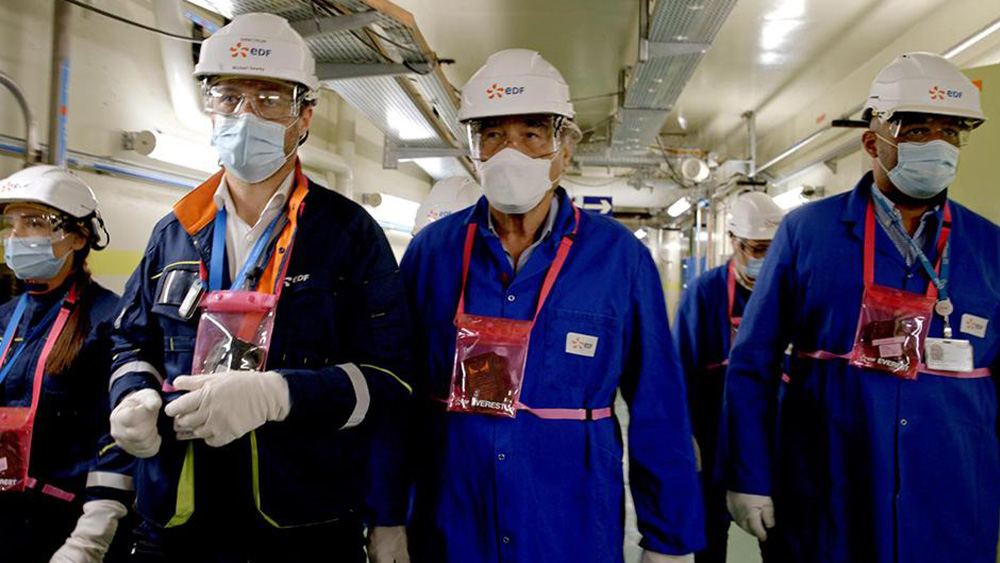
Surprisingly, Nuclear is not one of Oliver Stone’s “devil’s advocate” documentaries, the spate of films he started making in the early 2000s that seemed to troll liberals everywhere by spending time with notorious human-rights abusers such as Fidel Castro, Hugo Chavez and Vladimir Putin. In the real world right now, nuclear power is about as toxic as those three men put together, but this intelligent and surprising film is an investigation into how that PR damage came about, which makes it arguably more of a piece with his famous conspiracy thriller JFK than any of those. At nearly two hours, it’s a hard watch, being dominated by Stone’s dense, monotonous voice-over and featuring scientists with next to no screen presence (this explains a lot about Adam McKay’s decision to shoot Don’t Look Up with A-listers). Nevertheless, it puts forward a lot of unexpected proposals about nuclear energy, debunking powerful myths along the way.
It begins with a very busy prologue, which actually sets the hectic pace for the whole thing, in which Stone relates the very modern history of its subject, starting with the discovery of radium by Marie Curie in 1898. Nuclear energy suffered a brief image setback in 1945 after the double bombing of Japan, but by 1953 President Eisenhower was all about it, making his famous “Atoms For Peace” speech to the United Nations. Nuclear was going to be the way forward until — who else? — the fossil fuel lobby took issue with its benefits and paid lobbyists to defame it. By the 1970s that work had paid off, and when the Three Mile Island reactor suffered a meltdown in 1979 — the same year hit disaster movie The China Syndrome was in cinemas — rock stars were playing “No Nukes” concerts and Jane Fonda was on a mission to get the whole program shut down.
Oliver Stone: Director’s Career In Photos
Stone plays his hand early on with a very blunt mea culpa. “I too once believed the environmentalists were right and that nuclear power was dangerous,” he says. “We were, in a way, terribly miseducated, subconsciously cross-wiring nuclear war with nuclear power.” He has a valid point. “People don’t think well when they’re scared,” he adds, “and fear is a mind-killer.” The reason Stone seems to have changed his own mind is simple: climate change, which has recently supplanted the threat of nuclear war as the storm cloud hanging over modern society. And he makes a very good point: nuclear energy is clean, cheap and much safer than its bad rep would suggest — although the disaster at Fukushima in 2011 was pretty major, the bulk of its casualties were a result of the tsunami that caused it. Indeed, as with the rather more ominous Chernobyl, a major factor was poor design and human error (the rest of Japan’s reactors survived).
Stone acknowledges that nuclear energy has an uphill struggle in emerging markets — China and India being especially obstreperous, although his thesis starts to fray when extoling the virtues of the Russians (the film was obviously made before the shocking events in the Ukraine brought back the specter of Chernobyl and many more potential horrors besides). But while it sometimes feels like being slapped around the head with a rolled-up copy of New Scientist (and the late Vangelis’ soothing synths can do nothing about that), it’s an occasionally inspiring film to dip into, making the surprising assertion that young people, once the most vocal in the campaign against all things nuclear, are now espousing it (we even meet a “Nuclear power influencer” who posts on TikTok). Stone sees this as the way forward, and the experts seem to agree — or as nuclear-tech entrepreneur Caroline Cochran puts it, “For the younger generations, climate change is more of an imperative than worrying about nuclear war.”




